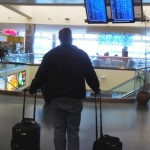Flight Cuts Hit Midsize Cities As They Try For A Turnaround

Molly Messick / StateImpact Idaho
On a Monday morning, the Southwest ticket counter at Boise Airport was mostly vacant. The airline recently suspended service from Boise to Seattle, Salt Lake and Reno.
Boise resident C.K. Haun has this routine down. He may live in Idaho, but he’s a senior engineer at Apple. Long before the sun is up, he arrives at the Boise Airport, to catch his regular flight to San Jose. “I can do this by autopilot now,” he says. “Most of the TSA people know me, and we smile and say hi. Every Monday morning, week in week out!”
Flight Cuts Hit Midsize Cities As They Try For A Turnaround
Haun has been making this commute for seven years. Not long ago, he saw a surprising change. His return flight – the one that came back after the workday – vanished. The only option was a flight leaving San Jose in the late morning. Haun says that’s bad for him, and bad for Boise. He points to the software developers and hardware manufacturers that call Boise home. Haun predicts they’ll have a harder time without that one-day, back-and-forth trip.

Airports Council International - North America
To see a graph of how midsize airports have been affected by flight cuts, click on the image above.
“It’s the whole valley that really is going to suffer if we don’t have great movement between the technology hub of the Silicon Valley and the burgeoning technology industries we have up here,” Haun says. “Modern transportation is critical for the economic success of the Treasure Valley.”
It’s no secret that airlines are cutting back. Faced with the double hit of the recession and high fuel prices, they’ve had no choice but to offer fewer flights and fly fuller planes. Midsize airports like Boise’s have been especially hard hit by those decisions. Frontier and Southwest are only the most recent airlines to reduce the number of flights to and from the city. Like C.K. Haun, Boise business leaders worry all of this could spell trouble for Boise’s bid to become a turnaround town.

Molly Messick / StateImpact Idaho
Bill Connors is the president and CEO of the Boise Metro Chamber of Commerce.
When he learned of the flight shift, Haun summed up his concerns and sent them off in a letter. A copy of it landed on the desk of Bill Connors, president and CEO of the Boise Metro Chamber of Commerce, who talked it over with airport officials. “All of us agree – that’s a strategic route for us,” he says.
Connors had already been thinking about Boise’s air service. He says the city is lucky to be just a short trip from major hubs, like Salt Lake City and Denver. But that doesn’t mean Boise can afford to lose flights. After all, it’s one of the most remote cities in the country. Connors says that means Boise has to be proactive. “These are market forces at work,” he says, “and if those planes aren’t full, the airlines are going to make some decisions based on the marketplace. So, now it becomes important to us to see, ‘Are there some incentives to keep particular routes alive?'”
This isn’t just about the San Jose flight. It’s about making sure Boise is as well connected as it can be. Connors says ensuring that could mean asking hard questions of Boise’s business community. For example, Connors says, “‘How much travel do you do between those two cities, and can you pledge that you’re going to buy x number of tickets?’ And maybe even go a step further and say, ‘Hey, would you kick in a little something for a marketing fund to try to attract these folks?’ You know, put a little skin in the game.”

Molly Messick / StateImpact Idaho
Bryant Francis, a Boise Airport Deputy Director, is making Boise's case to airlines.
If they do try to retain or attract particular flights, Boise business leaders will be pushing back against big trends. In 2007, the Boise Airport tallied more than 3.3 million passengers. Last year, the number was 2.8 million. It’s those kinds of declines that have airlines scrambling to contain costs. Midsize airports are scrambling, too. “It’s not just Boise Airport that’s out there trying to grow again,” says Bryant Francis, a deputy director of the Boise Airport. “It’s all the other airports as well.”
It’s Francis’s job to make Boise’s case to the airlines. He cultivates relationships and marshals facts. Lately, it’s a job that’s more and more competitive. “In years past, there were airports that just really weren’t in the game,” he says. “They weren’t out there marketing themselves to the carriers. They weren’t doing a lot of advertising within their local community to ensure that those in the community that were looking to fly thought of their airport first. And that has changed.”
In other words, there are more airports grasping for a scarce resource: flights. At the same time, as Francis knows well, there’s only so much any airport can do to reverse its short-term fortunes. “The airlines aren’t here for us,” he says. “The airlines are here for themselves and their shareholders. And it’s what we, our market, can do for them that is the most important thing.”

Molly Messick / StateImpact Idaho
Deputy Director Francis collects all sorts of airplane replicas and figurines. They adorn the shelves on his wall, as well as his desk.
Aviation consultant Michael Boyd couldn’t agree more. “The reality of it is, you can get all the aggressive you want,” he says. “There’s no airline store, and there’s a limited amount of additional air service you can attract.”
He also says midsize cities like Boise shouldn’t look at the number of flights going in and out. The key issue, he says, is access to the rest of the world. Not convenient access. Just access. Period. “This is the number one issue,” he says. “Can Mr. Jian get here from Beijing? Can Mr. Smith get here from New York City? Boise ain’t never going to have a nonstop to New York City! But you probably have, each day, five or six option in terms of when you can leave to get to New York City with one connection.”
Boyd says Boise may actually be in an enviable position. Yes, the city’s remoteness makes strong air service important. But it also means the Boise Airport doesn’t have nearby competitors. It has a captive customer base. In that sense, the city’s weakness is also its strength.

